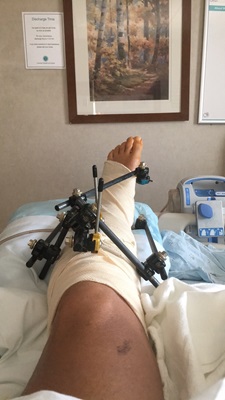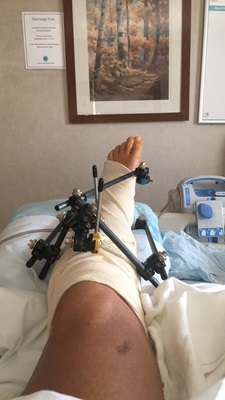

Reflections on Motorcycle Accidents and the Legal System
The recent case of a Harford County man who underwent seven surgeries in seven days after a severe motorcycle accident has sparked a conversation about the legal, medical, and financial issues that follow such traumatic incidents. This article aims to take a closer look at the twisted events leading to the crash, the challenges in the recovery process, and the legal battles that often follow major accidents. While exploring these topics, we will also consider the fine points and tangled issues of how the community supports those in distress and how law interacts with such personal tragedies.
Motorcycle accidents present a unique set of tricky parts and intimidating challenges—not only for the victims who face physical injuries but also for families who encounter overwhelming legal and financial burdens in the aftermath of an accident. In this opinion editorial, we are going to explore how one man’s dramatic medical journey also highlights the legal corners that need to be addressed and the social responsibility that comes with seeking justice.
Understanding the Accident: The Day That Changed Everything
In late June, Kevin Peters was riding his motorcycle northbound on Route 40 through Edgewood when a Lincoln Navigator, executing a U-turn, collided with him. The impact not only crushed his motorcycle but also resulted in his bike having to be described as being “mechanically removed” from his body by his sister, Samantha Peters. In a matter of moments, a routine ride transformed into a life-altering experience, leaving Peters with multiple severe injuries including a fractured skull, epidural hematoma, and a series of broken bones.
This crash forces us to get into the risky territory of accident liability. Police reports and witness testimonies in such cases are critical in determining the degree of negligence. While this is only one instance, it represents a common scenario where accountability is in question. Determining who is at fault in such incidents is loaded with problems—for both the legal system and the individuals involved.
Injury Impact and Medical Recovery: A Legal Perspective
After the crash, Kevin Peters was rushed to a local hospital where doctors performed immediate life-saving measures. His brain underwent a procedure to drain excessive blood and relieve internal pressure, and he was intubated and placed on a ventilator. The subsequent surgeries, which included multiple procedures targeting his skeletal and brain injuries, highlight the nerve-racking nature of traumatic injuries.
Here, the recovery process after an accident raises several legal questions about medical malpractice, informed consent during emergency interventions, and future liability. The following sections explore the legal expectations of hospitals and their staff when performing such critical procedures, as well as the challenging and complicated pieces of recovery from an injury of this magnitude.
Medical Negligence and Duty of Care in Trauma Cases
The role of medical professionals in the wake of a severe accident is both essential and under constant scrutiny. In cases like Kevin Peters’, the emergency response team and subsequent surgical interventions are vital in preserving life. However, amid the tense moments of an emergency, there can be small distinctions in the performance of these procedures that may lead to legal disputes if anything goes awry. These legal claims, often steered by the question of whether the appropriate duty of care was provided, can suddenly plunge families into prolonged litigation.
For families contemplating a malpractice lawsuit, the challenges include:
- Determining if all standard protocols were followed under extreme conditions.
- Gathering data from multiple sources including emergency response records and surgery reports.
- Understanding the tiny legal twists and turns in consent procedures during emergencies.
- Recognizing that the recovery process itself might be a metric for assessing the success or failure of medical interventions.
It is super important for legal experts specializing in medical negligence to guide families through these tangled issues so that they can eventually find their way through a maze of legal documents and court hearings.
Financial and Legal Burdens: Navigating a Post-Accident World
While the immediate focus after a severe accident is naturally on survival and medical recovery, the financial impact soon becomes a key concern. Medical bills, long-term rehabilitation costs, home modifications, and lost wages create an intimidating economic aftermath. For a victim like Kevin Peters, whose family set up a GoFundMe to support his recovery, the legal system can sometimes offer little in the way of timely relief or compensation.
Legal claims in accident cases are often designed to recoup losses that extend far beyond lump sum settlements. However, families with injured loved ones find themselves embroiled in a system where the legal processes are both overwhelming and complicated by fine details that many find off-putting. Legal battles after motorcycle accidents are full of problems as they involve compensatory and punitive damages, insurance disputes, and the need for long-term financial planning.
Breaking Down Legal Compensation in Motorcycle Accidents
Understanding the legal compensation process after a motorcycle accident involves a careful look at the following key elements:
- Medical Expenses: Coverage for immediate treatment as well as ongoing rehabilitation, including surgeries, therapy sessions, and necessary medical equipment.
- Loss of Income: Compensation for wage loss, both short-term and potentially long-term if the victim is unable to return to work.
- Pain and Suffering: This intangible yet key part of compensation addresses the physical and emotional distress experienced by the victim.
- Future Damages: Additional claims include future medical expenses, long-term care, and modifications required for home and vehicle accessibility.
An illustrative table below encapsulates common categories of compensation sought in such claims:
| Category | Description |
|---|---|
| Medical Expenses | Current and projected medical treatment costs, including rehabilitative services. |
| Lost Wages | Income loss during recovery and potential future earnings loss. |
| Pain and Suffering | Physical discomfort and emotional distress experiences post-accident. |
| Rehabilitation Costs | Long-term physical therapy, home modifications, and mobility aids. |
| Legal Expenses | Costs incurred while pursuing claims through the legal system. |
Each of these categories is entwined with legal regulations that define the scope and amount of compensation available. For many, understanding these categories requires digging into the fine details of local laws and precedents, which varies widely across jurisdictions.
Community Support, Fundraising, and Legal Implications
The establishment of a GoFundMe by Kevin Peters’ sister, Samantha, underscores a growing trend where communities turn to grassroots fundraising in the absence of swift legal compensation. This modern approach to community support, while heartwarming, also nudges us to consider the gaps in the legal framework when it comes to speeding up financial help during emergencies.
What becomes evident is that a safety net provided by community initiatives, although essential, is not a substitute for prompt and fair legal relief. The funds raised through platforms like GoFundMe are often used to cover immediate medical costs, rehabilitation aides, and living expenses. However, these donations rarely address the long-term financial burdens that victims face, leaving many, like Kevin, with an ongoing legal and financial struggle.
Legal Action and Insurance Claims
The transition from community fundraising to formal legal actions is often marked by the following steps:
- Filing an official incident report and gathering necessary evidence from the crash scene.
- Engaging with insurance companies who may offer settlements that do not fully cover the long-term expenses.
- Consulting with professional attorneys specialized in motorcycle accidents to establish liability and ensure a fair compensation package.
- Handling legal negotiations and potential court proceedings where even small twists in testimony can influence the outcome.
Often, the path through legal claims is peppered with nerve-racking delays and unexpected examinations. While insurance companies sometimes propose quick settlements, these offers can be both confusing and overwhelming, particularly when they do not fully account for the magnitude of future rehabilitation costs and enduring disability needs.
Long-Term Rehabilitation and Legal Accountability
Kevin Peters’ journey, which includes further leg reconstruction surgeries and a long road to potential recovery of mobility, is a testament to the resilience of the human spirit. However, it also illuminates the long tail of complicated legal and medical challenges that follow such accidents.
Rehabilitation after traumatic motorcycle crashes is an ongoing process that brings forth many tricky parts. The interim period where the victim adjusts to new physical limitations is ripe with legal uncertainties. For instance, decisions made early in the litigation process, such as accepting quick settlements, may be influenced by the overwhelming urgency to cover immediate expenses rather than securing long-term rehabilitation funds.
Managing Legal Outcomes for Long-Term Disability
When legal outcomes fall short of the victim’s long-term needs, the following key issues often arise:
- Future Medical Care: Assessing the full scope of long-term therapy, including physical and occupational therapy, which is super important for recovery.
- Home and Mobility Modifications: Making life sustainable, such as installing ramps or modifying vehicles, which may not be adequately covered.
- Ongoing Financial Strain: Lost wages and the inability to return to work fully are heavy burdens that the legal system must attempt to measure in compensation.
- Psychological Support: Recognizing the mental and emotional toll that severe accidents impose on the victim and their family.
Legal frameworks related to long-term disability need to account for these delicate issues. Lawyers and legal experts must often work closely with medical professionals to assess the hidden complexities of recovery. The small distinctions in how each case is treated can have significant long-term financial repercussions for families already reeling from the immediate aftermath of an accident.
Evaluating the Role of Legislation in Motorcycle Accident Cases
The situation faced by Kevin Peters is not unique, and it raises comprehensive questions regarding how current legislation addresses motorcycle accidents. Legislative policies need to cover several fine points to ensure that injured parties receive fair treatment. These laws must be robust enough to handle both the emergency dimension of trauma and the extended burdens of rehabilitation.
Some of the key legislative areas under scrutiny include:
- Road Safety Regulations: How authorities enforce traffic rules and whether changes could minimize high-risk maneuvers such as dangerous U-turns in busy corridors.
- Insurance Reforms: Ensuring that insurance companies are held accountable for quick and fair settlements that can cover both immediate treatment and future needs.
- Medical Liability Laws: Defining and safeguarding the boundaries of medical duties during emergency care while protecting patients’ rights for subsequent claims.
- Victim Support Policies: Creating legal channels that facilitate immediate and adequate financial assistance for those who suffer debilitating injuries.
Recent debates in local and state legislative bodies suggest that stakeholders are aware of the necessity to make critical changes. For instance, proposals to adjust the liability standards when multi-vehicle collisions occur have come under consideration. These efforts seek to figure a path through the tangled issues of fault and restitution, ensuring that the financial and emotional burdens on individuals and families are not left to be sorted out solely through community fundraising.
How Legislators Can Protect Motorcycle Riders
Legislators can work towards improving the legal framework for motorcycle accident cases by:
- Implementing stricter driving regulations and better traffic management systems in high-risk areas.
- Ensuring that insurance policies include provisions for long-term rehabilitation support.
- Involving medical professionals and legal experts in the drafting of bills to cover all aspects of post-accident recovery.
- Establishing fast-track legal processes for severe injury claims to minimize the nerve-wracking wait times for justice.
Bringing these measures to fruition would undoubtedly benefit individuals who, like Kevin Peters, face life-changing challenges as a result of road accidents. The legal system must strive to step up its efforts to assure fair compensation and continuous support throughout the lengthy recovery period.
Community Resilience and the Legal System: A Bid for Justice
The ordeal faced by families dealing with the aftermath of severe motorcycle accidents is emblematic of some of the smallest and most complicated parts of our legal system. What starts as a personal tragedy quickly escalates into one of the most confusing bits of legal and financial struggle. The human element in these cases demands compassion and efficiency from both the community and the administrative bodies meant to safeguard citizen well-being.
The story of Kevin Peters reminds us that while community fundraising initiatives such as GoFundMe platforms fill an immediate gap, they shine a light on larger issues within the judicial and insurance frameworks. Families are often forced to take to these public avenues because the legal proceedings to secure adequate restitution can be slow and filled with nerve-wracking delays. Recognizing and addressing this gap is essential if we are to ensure that victims are truly supported in both their immediate and long-term battles.
Key Lessons for the Legal Community
There are several important lessons that legal experts can extract from cases like this:
- Timeliness of Legal Action: It is essential for attorneys to engage quickly to help victims get the financial support necessary for emergency and long-term care.
- Thorough Documentation: Accurate records of the accident and subsequent medical treatments are critical in building a strong legal case.
- Interdisciplinary Collaboration: Lawyers, medical professionals, and insurance representatives must work together to provide a comprehensive approach to addressing the victim’s needs.
- Public Awareness: Increased community knowledge about legal rights and the support available can empower victims and their families to demand fair treatment and justice.
Moreover, the legal community must be proactive in educating the public on the fine points of motorcycle accident claims. Secondary support services, such as counseling and advocacy, can help families better understand the subtle parts of how litigation can complement social fundraising efforts.
Legal and Financial Reforms: Moving Toward Better Outcomes
There is no doubt that accelerating legal proceedings and ensuring fair settlements in motorcycle accident cases could alleviate a significant portion of the burden faced by families. The various twists and turns of this legal journey call for reforms at multiple levels of the judicial process. From faster court processes to more transparent interactions with insurance companies, the goal should be to make the legal pathway less overwhelming and more accommodating to the suffering victim.
Reforms that could significantly improve the situation include:
-
Streamlined Legal Processes:
Implementing fast-track systems for cases involving severe injuries ensures that victims do not have to endure an excessively long wait for justice. This would involve dedicated courts or legal teams specialized in accident cases.
-
Enhanced Insurance Regulation:
Updating policies and regulatory frameworks so that insurance companies are mandated to offer not only immediate compensation but also provisions for the long-term rehabilitation and financial stability of injured parties.
-
Increased Public Funding:
State and local governments could consider establishing funds specifically aimed at covering emergency medical costs and partial rehabilitation expenses, thereby easing the immediate financial strain on families.
-
Legal Aid Expansion:
Expanding access to free or low-cost legal services for accident victims can help ensure that more people are adequately represented and that their cases are managed with the attention they require.
These proposals are not meant to replace the need for community solidarity and fundraising but instead aim to reinforce it. The legal system and public policy must work in tandem to ensure that everyone who suffers a traumatic accident receives the comprehensive support they need to rebuild their lives.
The Broader Implications: Safety, Legislation, and Society
The tale of a single man’s struggle after a motorcycle accident extends far beyond one individual’s story—it forces us to think about road safety, legislative responsibility, and the role of community support in times of crisis. The automotive and motorcycle industries, traffic safety regulators, and lawmakers are all called upon to review current practices and to figure a path that minimizes these accidents through improved infrastructure and rigid safety standards.
In a society where personal tragedy can quickly spiral into a web of tangled legal and financial issues, every stakeholder must take responsibility. The small distinctions in our legal protections can, quite literally, be a matter of life and death. There is a critical need for collaboration among community members, legislators, and legal professionals to forge a system that is both just and responsive to the chaotic reality of violent motorcycle accidents.
Strengthening Community and Legal Collaboration
The intersection of community support and the legal system offers an opportunity for systemic improvement. Here are some steps that can be taken to move forward:
- Educational Workshops: Hosting workshops that discuss the legal and financial aspects of motorcycle accidents can empower the public with knowledge to better handle such challenges.
- Collaborative Networks: Encouraging partnerships between legal aid organizations, medical professionals, and community groups to create a more effective safety net for accident victims.
- Policy Advocacy: Mobilizing community voices to advocate for legislative reforms that protect the rights and welfare of injured individuals.
- Regular Audits: The legal and insurance systems should undergo regular audits to ensure transparency and fairness in the processing of accident claims.
These measures could help bridge the gap that frequently leaves accident victims feeling abandoned by a system loaded with confusing bits and overwhelming regulatory requirements. It is super important to acknowledge that collective responsibility—not just legal responsibility—is key to creating safer roads and a fairer aftermath process for those affected by such tragedies.
Conclusion: A Call for Compassionate Legal Reform
As we reflect on the hardships endured by Kevin Peters and many others in similar situations, it becomes increasingly clear that the legal system, community support networks, and legislative bodies must work closely together to ensure better outcomes for accident victims. Whether it is through reforming insurance practices, expediting legal processes, or enhancing community outreach programs, there are many opportunities to alleviate the nerve-wracking challenges that families face after such traumatic events.
This opinion editorial stands as a call for reform and compassion. While we must acknowledge the heroic efforts of medical professionals and the generosity of community fundraisers, it is also necessary to address the underlying legal and financial challenges that remain neglected. By tackling the tangled issues in legal compensation and reforming our approach to accident recovery, we pave the way for a future where victims are not forced to fight a prolonged battle on top of their physical and emotional pain.
Your voice matters in advocating for change. Let us work together—lawyers, legislators, and community members alike—to ensure that no individual or family has to endure the overwhelming burden of navigating a broken system alone.
In charting a course for future legal excellence, we all must get into the responsibility of creating a safety net robust enough to support our most vulnerable citizens. As we stand at the crossroads of personal tragedy and systemic reform, let us choose the path of justice, support, and comprehensive rehabilitation. The road ahead may be riddled with tension and filled with confusing bits, but together we can steer through these challenges toward a more equitable and compassionate future.
Originally Post From https://patch.com/maryland/belair/man-endures-7-surgeries-7-days-after-motorcycle-crash-gofundme-created
Read more about this topic at
Triumph over Trauma: Find Healing and Wholeness from …
Triumph Over Trauma


